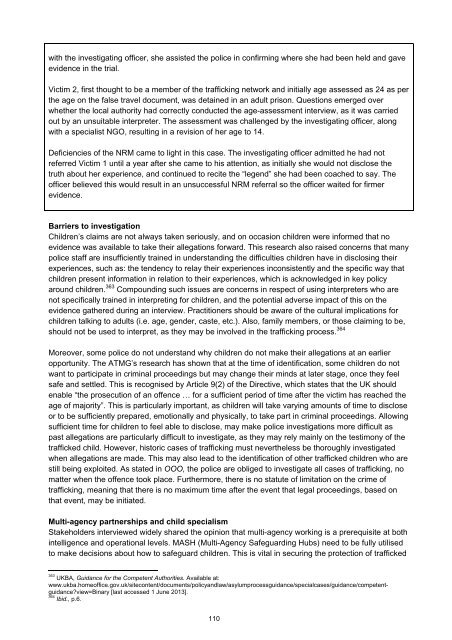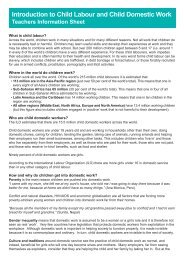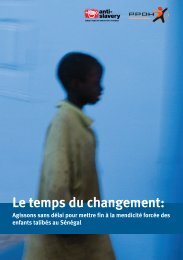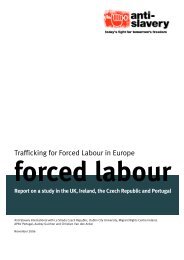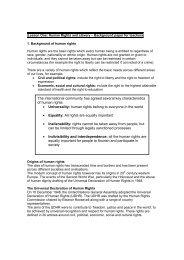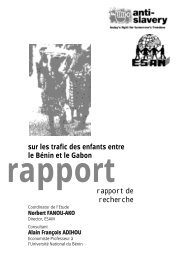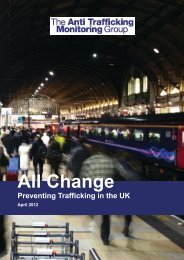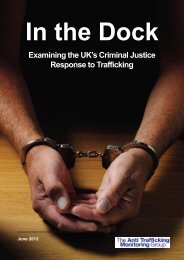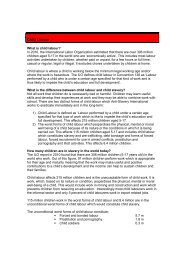with <strong>the</strong> investigating officer, she assisted <strong>the</strong> police in confirming where she had been held and gaveevidence in <strong>the</strong> trial.Victim 2, first thought to be a member of <strong>the</strong> trafficking network and initially age assessed as 24 as per<strong>the</strong> age on <strong>the</strong> false travel document, was detained in an adult prison. Questions emerged overwhe<strong>the</strong>r <strong>the</strong> local authority had correctly conducted <strong>the</strong> age-assessment interview, as it was carriedout by an unsuitable interpreter. The assessment was challenged by <strong>the</strong> investigating officer, alongwith a specialist NGO, resulting in a revision of her age to 14.Deficiencies of <strong>the</strong> NRM came to light in this case. The investigating officer admitted he had notreferred Victim 1 until a year after she came to his attention, as initially she would not disclose <strong>the</strong>truth about her experience, and continued to recite <strong>the</strong> “legend” she had been coached to say. Theofficer believed this would result in an unsuccessful NRM referral so <strong>the</strong> officer waited for firmerevidence.Barriers to investigationChildren’s claims are not always taken seriously, and on occasion children were informed that noevidence was available to take <strong>the</strong>ir allegations forward. This research also raised concerns that manypolice staff are insufficiently trained in understanding <strong>the</strong> difficulties children have in disclosing <strong>the</strong>irexperiences, such as: <strong>the</strong> tendency to relay <strong>the</strong>ir experiences inconsistently and <strong>the</strong> specific way thatchildren present information in relation to <strong>the</strong>ir experiences, which is acknowledged in key policyaround children. 363 Compounding such issues are concerns in respect of using interpreters who arenot specifically trained in interpreting for children, and <strong>the</strong> potential adverse impact of this on <strong>the</strong>evidence ga<strong>the</strong>red during an interview. Practitioners should be aware of <strong>the</strong> cultural implications forchildren talking to adults (i.e. age, gender, caste, etc.). Also, family members, or those claiming to be,should not be used to interpret, as <strong>the</strong>y may be involved in <strong>the</strong> trafficking process. 364Moreover, some police do not understand why children do not make <strong>the</strong>ir allegations at an earlieropportunity. The ATMG’s research has shown that at <strong>the</strong> time of identification, some children do notwant to participate in criminal proceedings but may change <strong>the</strong>ir minds at later stage, once <strong>the</strong>y feelsafe and settled. This is recognised by Article 9(2) of <strong>the</strong> Directive, which states that <strong>the</strong> UK shouldenable “<strong>the</strong> prosecution of an offence … for a sufficient period of time after <strong>the</strong> victim has reached <strong>the</strong>age of majority”. This is particularly important, as children will take varying amounts of time to discloseor to be sufficiently prepared, emotionally and physically, to take part in criminal proceedings. Allowingsufficient time for children to feel able to disclose, may make police investigations more difficult aspast allegations are particularly difficult to investigate, as <strong>the</strong>y may rely mainly on <strong>the</strong> testimony of <strong>the</strong>trafficked child. However, historic cases of trafficking must never<strong>the</strong>less be thoroughly investigatedwhen allegations are made. This may also lead to <strong>the</strong> identification of o<strong>the</strong>r trafficked children who arestill being exploited. As stated in OOO, <strong>the</strong> police are obliged to investigate all cases of trafficking, nomatter when <strong>the</strong> offence took place. Fur<strong>the</strong>rmore, <strong>the</strong>re is no statute of limitation on <strong>the</strong> crime oftrafficking, meaning that <strong>the</strong>re is no maximum time after <strong>the</strong> event that legal proceedings, based onthat event, may be initiated.Multi-agency partnerships and child specialismStakeholders interviewed widely shared <strong>the</strong> opinion that multi-agency working is a prerequisite at bothintelligence and operational levels. MASH (Multi-Agency Safeguarding Hubs) need to be fully utilisedto make decisions about how to safeguard children. This is vital in securing <strong>the</strong> protection of trafficked363UKBA, Guidance for <strong>the</strong> Competent Authorities. Available at:www.ukba.homeoffice.gov.uk/sitecontent/documents/policyandlaw/asylumprocessguidance/specialcases/guidance/competentguidance?view=Binary[last accessed 1 June 2013].364Ibid., p.6.110
children as well as assisting in prosecutions. The multi-agency approach can also help reduce <strong>the</strong>number of times <strong>the</strong> trafficked child has to disclose <strong>the</strong>ir ordeal, which can in itself be very traumatic.Multiple assessments can confuse a child and lead to only partial disclosure in line with <strong>the</strong> focus of<strong>the</strong> assessment. <strong>In</strong>consistencies can also lead agencies to disbelieve <strong>the</strong> child. 365 Therefore, morestreamlined, holistic, multi-agency interviews should be utilised to gain better evidence and to reduce<strong>the</strong> risk of re-traumatisation.Good practice - Paladin Team<strong>In</strong> 2003, <strong>the</strong> MPS established a child safeguarding team - Paladin, based at Heathrow Airport. Thismulti-agency team, comprised of police and <strong>the</strong> UKBA, was tasked to “disrupt all forms of child abuseparticularly child trafficking throughout London ports”. 366 It aimed to be a good practice model for o<strong>the</strong>rports across <strong>the</strong> UK. 367 Paladin is frequently cited as a good example of effective multi-agencyworking to tackle child trafficking in <strong>the</strong> capital. The effectiveness of <strong>the</strong> team essentially lies in itsmembers working in <strong>the</strong> same office. This allows for <strong>the</strong> quick exchange of information and <strong>the</strong>cultivation of working relationships and practices.The Paladin Team works very closely with its local authority, Hillingdon. When cases are picked up atHeathrow Airport, <strong>the</strong> local authority social workers work alongside Paladin to support interviews andprovide safe accommodation. They also regularly meet to share information and learn from eacho<strong>the</strong>r. Paladin’s successful prosecutions include R v Peace Sandberg, 368 R v Ernestina and SamuelQuainoo 369 and R v Lucy Adeniji. 370 However, Paladin is limited to covering London’s ports. Lawenforcement interviewed for this research claim that <strong>the</strong>re needs to be a Paladin-style dedicatedtrafficking team at all main ports in <strong>the</strong> UK to raise awareness, keep children safe and improveprosecution rates by building on <strong>the</strong>ir previous experience in successful cases.Operation Newbridge, by Sussex Police, works in a similar fashion to Paladin and focuses on profilingchildren entering <strong>the</strong> UK via Gatwick Airport.Professionals interviewed by <strong>the</strong> ATMG reported that many teams tasked with child protection andinvestigating child abuse across <strong>the</strong> UK are specialists when dealing with traditional child protectionissues, such as abuse within <strong>the</strong> family, but lack specific knowledge of trafficking and of dealing withinvestigations of organised criminal networks. One law enforcement officer stated: “Child trafficking isnot on our child protection team’s list of things to deal with.” Alternatively, those officers who aretrained in trafficking may often not have <strong>the</strong> child focus required or any specialist experience ofworking with children.Although teams such as Paladin have proved effective in both identification and subsequentinvestigations, it is important to note that not all child victims of trafficking will come to <strong>the</strong> attention ofauthorities at <strong>the</strong>ir respective ports of entry – many pass through unnoticed, some enter on forged orsomeone else’s passports. Some are already present in <strong>the</strong> UK, or have <strong>the</strong> legal right to enter andremain or are British. All police forces and o<strong>the</strong>r agencies need training to recognise child trafficking,not just those at ports of entry.365Final monitoring report: Local authority pilots of <strong>the</strong> London Safeguarding Trafficked Children guidance and toolkit (2011)366Child Migration & trafficking to <strong>the</strong> UK. Available at:www.londonscb.gov.uk/files/resources/cpp/Police%20trafficking%20presentation.ppt.367Paladin child: <strong>the</strong> safeguarding children strand of Maxim funded by Reflex: a partnership study of child migration to <strong>the</strong> UK viaHeathrow Airport (2008).368R v Peace Sandberg at Isleworth Crown Court, 16 May 2008.369R v Ernestina and Samuel Quainoo at Isleworth Crown Court, 11 July 2008.370Adenij, supra note 275.111
- Page 1 and 2:
In the DockExamining the UK’s Cri
- Page 3 and 4:
AcknowledgementsThis report was mad
- Page 5 and 6:
PrefaceIn May 2009, a group of nine
- Page 7 and 8:
Misconceptions around exploitation
- Page 9 and 10:
Acronyms and abbreviations frequent
- Page 11 and 12:
Executive SummaryIn the Dock is The
- Page 13 and 14:
Furthermore, the current legislatio
- Page 15 and 16:
The ATMG was made aware of some cas
- Page 17 and 18:
• Introduce mandatory child-speci
- Page 19 and 20:
• The UK’s ability to meet the
- Page 21 and 22:
Traffickers’ primary motivation i
- Page 23 and 24:
• Money launderers - turn profits
- Page 25 and 26:
out to perpetuate the exploitative
- Page 27 and 28:
[their] own enslavement” is as fu
- Page 29 and 30:
Chapter 2: UK Anti-Trafficking Legi
- Page 31 and 32:
nationals who commit trafficking of
- Page 33 and 34:
Like the SOA, the “act” element
- Page 35 and 36:
(b) D requires another person to pe
- Page 37 and 38:
Forced or compulsory labourThe defi
- Page 39 and 40:
ConclusionAs a consequence of the s
- Page 41 and 42:
concerningly, the number of convict
- Page 43 and 44:
women who were recruited in Poland
- Page 45 and 46:
Chapter 4: Identifying trafficking
- Page 47 and 48:
Misconceptions around exploitationT
- Page 49 and 50:
espond inadequately to a trafficked
- Page 51 and 52:
multi-agency teams was described by
- Page 53 and 54:
Josie Connors. 179 In summary, inte
- Page 55 and 56:
defending a trafficked person for f
- Page 57 and 58:
“[B]ecause the NRM decision is on
- Page 59 and 60:
PTSD. 196 A Consultant Psychiatrist
- Page 61 and 62: etween the client and the police, i
- Page 63 and 64: Regular communication needs to be s
- Page 65 and 66: Priority planningA particular issue
- Page 67 and 68: Chapter 6: Multi-agency and interna
- Page 69 and 70: canvassing for tarmacking opportuni
- Page 71 and 72: Despite this, it would appear that
- Page 73 and 74: Good practice - Operation Golf 229O
- Page 75 and 76: Chapter 7: Criminal proceedingsThe
- Page 77 and 78: Law enforcement working on the case
- Page 79 and 80: trafficking require particular unde
- Page 81 and 82: JuryPractitioners suggested that th
- Page 83 and 84: years”. 258 Ambiguity within the
- Page 85 and 86: officer stated that not all judges
- Page 87 and 88: jurors to be assisted with expert e
- Page 89 and 90: Good feedback was received from sem
- Page 91 and 92: The Convention does recognise that
- Page 93 and 94: Another option for trafficked victi
- Page 95 and 96: There are two models with respect t
- Page 97 and 98: 1. Is there clear evidence that the
- Page 99 and 100: decision can be taken into account
- Page 101 and 102: also entails being “alert to the
- Page 103 and 104: In some cases concerns were even ra
- Page 105 and 106: Chapter 9: Prosecuting child traffi
- Page 107 and 108: However, many children are not refe
- Page 109 and 110: trafficking”. 352 It states: “W
- Page 111: Previous research has found that th
- Page 115 and 116: Child trafficking trainingThere is
- Page 117 and 118: were too traumatic to involve them
- Page 119 and 120: committed by a child whilst in a co
- Page 121 and 122: • Introduce mandatory child-speci
- Page 123 and 124: IdentificationThe PSNI is the main
- Page 125 and 126: participants suggest that this is b
- Page 127 and 128: The PPS stated that the reasons for
- Page 129 and 130: this research was aware of potentia
- Page 131 and 132: convictions of traffickers prosecut
- Page 133 and 134: Possibly in response to certain hur
- Page 135 and 136: espectively. In addition to custodi
- Page 137 and 138: Conclusion and RecommendationsThe A
- Page 139 and 140: CRIMINAL PROCEEDINGS• Ensure that
- Page 141 and 142: Crown Prosecution Service, Legal Gu
- Page 143 and 144: Herman. J. Trauma and Recovery: The
- Page 145 and 146: Annex I: Trafficking and other form
- Page 147 and 148: (a) on summary conviction, to impri
- Page 149 and 150: (b) which country is the country of
- Page 151 and 152: 2009 Istvan Kalocsai (Snr)MetS.57 o
- Page 153 and 154: 2009 causing actual bodily harm, su
- Page 155 and 156: Skirmantas Kvedaras Feed, 2010 Rape
- Page 157 and 158: 2012 Ahdel Ali (24)Mubarek Ali (29)
- Page 159 and 160: Annex III: The CPS’s Seven Stages
- Page 161 and 162: 159


